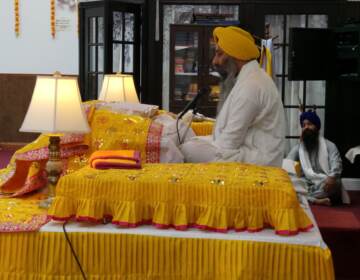Gov. Wolf, GOP leaders reach tentative budget deal providing historic education boost
Listen
Gov. Tom Wolf responds reporters' questions after speaking at a Pennsylvania Press Club luncheon Monday, Nov. 23, 2015 in Harrisburg, Pa. (Marc Levy/AP Photo)
Pennsylvania Governor Tom Wolf and top legislative leaders say they’ve reached an agreement to end the state’s more-than five month long budget impasse.
The tentative pact includes what would be the largest increase in state education spending in at least two decades.
The basic education subsidy would see a $350 million increase, special-education and pre-k funding would each receive a $50 million boost, in addition to $10 million more for Head Start.
“This is a big win for the state of Pennsylvania,” said Wolf, who described the increase in basic education funding “historic,” and worth the long wait.
“In a limited government, free market economy there is nothing more important a government can do than investing adequately in education,” he said. “Republicans have an overwhelming majority in the Senate and the House, I am a rookie Democratic governor. Having such a historic increase is a nice thing. In my mind, this is a big deal.”
The funding increases would be paid for largely by extending the reach of the state sales tax — adding new items, closing existing loopholes and jettisoning some exemptions for services and items that emerged in recent decades.
Leaders on both sides said they couldn’t yet specifically detail the additional items eligible for the sales tax.
Wolf, along with republican leaders in the House and Senate say they will not increase the rates of either the sales tax or personal income tax. Wolf’s proposed statewide tax on natural gas drilling would also be shelved.
“That’s unfinished business,” said Wolf of the gas drilling tax, as well as his hope to reduce the corporate net-income tax. “I’m coming back next year and pulling for the same things.”
Republican leaders highlighted the fact that some of the boost in education funding would also be covered by trimming spending elsewhere in the budget, but couldn’t provide specifics.
“This is something we have achieved without broad-based tax increases,” said Senate GOP spokeswoman Jennifer Kocher. “And we’ve been able to look at cutting spending at the state government level while at the same time increasing the money for education.”
Wolf expects the agreement will be finalized “within a few days.”
Officials previously announced a tentative budget agreement that included a sales tax hike in exchange for statewide property tax relief. That plan has now been scrapped, after Wolf and top Republicans couldn’t reach agreement on the finer details of the proposal. Both say property tax relief remains a high priority, but agreed to continue negotiations outside of the larger budget framework.
Leaders could not confirm how the increased education spending would affect individual districts, including Philadelphia.
The $350 million increase in basic education funding will be distributed, leaders said, based on a “hybrid” approach. Some will come through of a new student-weighted “fair” formula (one that takes into account student needs and poverty); another segment will come through a block grant formula, and the rest will be divided utilizing the state’s existing system. That one largely hands out dollars determined by “hold harmless” provisions to prevent districts from having to deal with sudden drops in aid.
Details of these divisions could not yet be confirmed.
Wolf said education increases in years to come would be completely driven through the student-weighted formula.
Education advocates lauded the tentative deal.
“It helps address how districts lost money and takes steps towards restoring that,” said Susan Gobreski, executive director of Education Voters PA. “I’m happy that there seems to be bipartisan support for a good formula and a significant allocation to schools throughout the region and Philadelphia.”
Often, Republicans in Harrisburg only agree to education spending increases, especially for Philadelphia, when there’s an added “accountability” measure.
“All of that is still being worked out, but we had previously asked every district to submit a plan that details how they will ensure the basic education funding is used in the classroom,” said Wolf spokesman Jeffrey Sheridan.
A review of historic data shows this to be the first time in at least the last two decades that there’s been a basic education increase exceeding six percent.
The $350 million basic ed increase easily exceeds the next biggest dollar increase, which was $300M in the 2009-2010 school year. Dollar increases have been as low as $49 million in 2012-13, and only three times, during the Ed Rendell administration, did they exceeded $250 million.
The budget deal also includes two items that have been longtime Republican priorities.
The pension system for future state workers, including teachers, would be modified as a hybrid of a defined benefit and a defined contribution plan — placing a share of the market risk on future individual employees, while removing some from the state and local school boards.
The tentative pact also includes a compromise that would allow wine to be sold in supermarkets and restaurants.
Nearing the end of his freshman-round of negotiations, Wolf reflected on the lessons of his first state budget debate.
“I think everybody here wants the best for Pennsylvania,” he said. “And we have maybe different ideas as to how to get there — maybe it takes us a little longer than it should have to finally get on the same page — but I think that was a very nice confirmation of what I expected to find.”
Dale Mezzacappa and Paul Socolar of the Philadelphia Public School Notebook contributed to this report.
WHYY is your source for fact-based, in-depth journalism and information. As a nonprofit organization, we rely on financial support from readers like you. Please give today.





